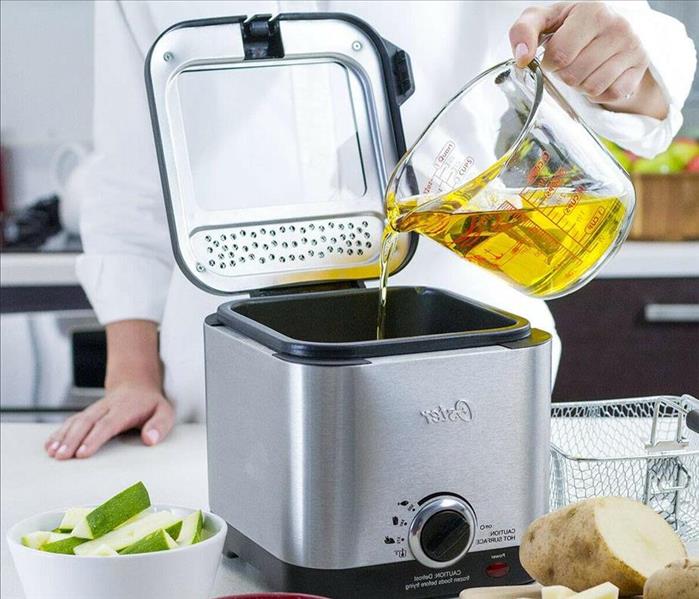Deep Fryer Safety
8/25/2021 (Permalink)
 SERVPRO of Paulding/Polk Counties are your local experts to help you turn that kitchen fire damage back into a functioning kitchen.
SERVPRO of Paulding/Polk Counties are your local experts to help you turn that kitchen fire damage back into a functioning kitchen.
Here in the south, fried foods are a necessary food group. It's as essential to our way of life as sweet tea. Frying foods at home is much easier thanks to residential deep fryers. So if you find yourself hankering for some fried chicken or veggies, following these tips to ensure you don't need to call the fire department or SERVPRO of Paulding/Polk Counties.
*Know your oil smoke point. Each type of cooking oil has it's own smoke point. This is the temperature that your oil begins to smoke and could catch fire.
*Don’t overfill your deep fryer. Most deep fryers have a max fill line. What most people don't account for is that this should include the food, not just the oil. Overfilling your deep fryer could result in spilling oil and causing a fire and uneven cooking due to the oil temperature dropping.
*Do not deep fry wet food. Water can cause hot oil to splash and spill over potentially resulting in a fire. Most frozen foods are already mostly dry, but fresh foods can contain a lot of moisture and need to be patted down before putting in hot oil.
*Keep your deep fryer in clear surroundings. Many deep fryers aren't cool to the touch when cooking. Make sure the are around your deep fryer is free from flammable and combustible materials.
*Make sure your deep fryer has a break-away cord. This is a standard safety feature on most home deep fryers to keep the fryer from tipping over if the cord is tripped up by something or someone. However, not all have this so inspect yours and use accordingly.
*Have a lid on hand. While not necessary, smothering is the safest way to put out a grease fire. If your deep fryer doesn't come with a lid, find something you can use that will work just as well.
*Keep a fire extinguisher handy. There are many people who've never thought to have a fire extinguisher in their kitchen in case of a fire. There are many options available for a fire extinguisher made for home use, so make sure you have one to on hand in your kitchen.
*Keep track of your temperatures. Many deep fryers have a built in temperature gauge to track how hot your oil is and make sure your fryer is cooking at the proper heat. These can malfunction so having a separate clip-on thermometer as a back up is a great idea.
*Dispose of oil properly. Always let the oil cool down completely before storing or disposing of it. If storing, make sure to filter out all food particles so your oil doesn't spoil prematurely. If disposing, make sure to pour into a air tight container. Never pour oil down a drain as it can cause the drain to clog and back up.
*Use proper protective equipment. Most foods won't splatter as long as excess moisture is removed, but fatty foods like bacon will splatter regardless. Using the handle on the fryer basket will protect you, but having protective gloves as secondary protection is always a good idea.
Should you find yourself faced with a kitchen fire, trust the experts at SERVPRO of Paulding/Polk Counties to help you make it "Like it never even happened."
*Source: Deep Fryer Safety Tips




 24/7 Emergency Service
24/7 Emergency Service